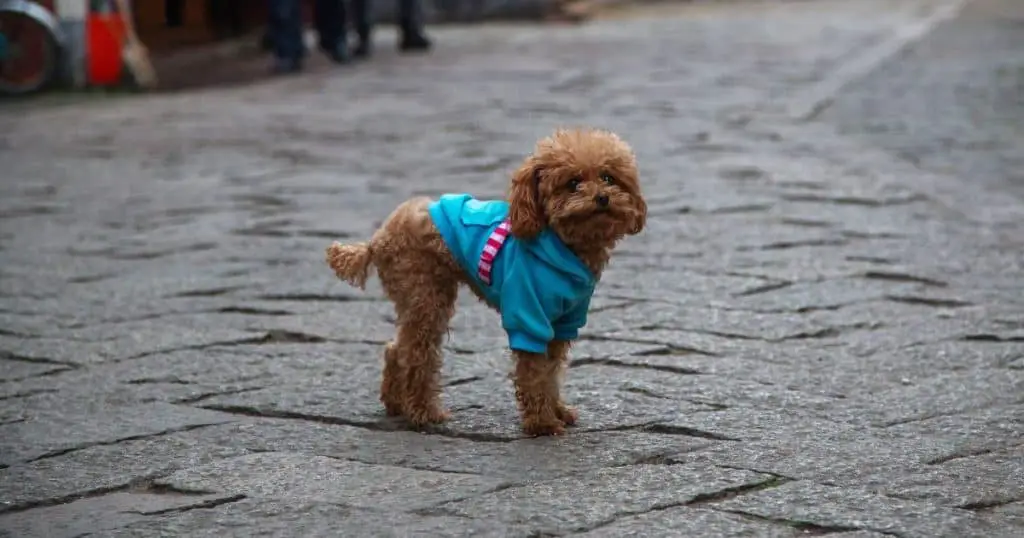What to Know
What Is the Temperament of A Toy Poodle?
Toy Poodles are a popular breed of dog that are known for their intelligence, playful nature, and small size. They are a great choice for families with children or individuals who are looking for a loyal and affectionate companion. However, before adopting a Toy Poodle, it is important to understand their temperament and personality.
In this article, we will discuss the Toy Poodle temperament in detail. We will cover the key characteristics that make them unique, such as their playfulness, intelligence, and sensitivity. We will also discuss their exercise needs, as well as their potential for separation anxiety and other behavioral issues.
Whether you are a first-time dog owner or an experienced handler, understanding the Toy Poodle temperament is essential for building a strong and lasting bond with your furry friend. So, let’s dive in and explore what makes this breed so special.
History of Toy Poodle
The Toy Poodle is a miniature version of the Standard Poodle and was bred to be a companion dog. The Poodle breed originated in Germany over 400 years ago and was originally used as a water retriever. In France, Toy Poodles became popular as lap dogs and were used as entertainment in circuses due to their intelligence and agility.
In the 18th century, Toy Poodles were popular among French aristocrats and became a symbol of wealth and status. They were often seen in the arms of fashionable ladies and were even used as bed warmers. The breed’s popularity spread to England and eventually to America, where they were recognized by the American Kennel Club in 1887.
Today, Toy Poodles are still popular as companion dogs and are known for their intelligence, affectionate nature, and hypoallergenic coat. They are often used in dog shows and competitions, where their agility and obedience skills are showcased.
Despite their small size, Toy Poodles have a big personality and are known for their loyalty and devotion to their owners. They require regular grooming to maintain their distinctive curly coat and benefit from daily exercise and mental stimulation.
Physical Characteristics of Toy Poodle
Size
The Toy Poodle is a small breed of dog that typically weighs between 4-6 pounds and stands around 10 inches tall. They are the smallest of the Poodle breed and are often referred to as the Teacup Poodle. Despite their small size, they are quite athletic and agile, making them great for various canine sports such as agility and obedience.
Coat
The Toy Poodle has a dense, curly coat that is hypoallergenic, making them a great choice for people with allergies. Their coat requires regular grooming to prevent matting and tangling. They do not shed much, which can be a plus for those who do not want to deal with excessive shedding. Regular brushing and grooming can also help to reduce the amount of hair that falls out.
Color
The Toy Poodle comes in a variety of colors, including black, white, brown, gray, silver, and cream. They can also have parti-color, which is a combination of two or more colors. The color of their coat can vary depending on their genetics and breeding. Some Toy Poodles may have a solid color coat, while others may have a combination of colors.
In conclusion, the Toy Poodle is a small breed of dog that has a dense, curly coat that is hypoallergenic and requires regular grooming. They come in a variety of colors and are quite athletic despite their small size. Their size, coat, and color make them a popular choice for many dog owners.
The Personality of a Toy Poodle

Intelligence
Toy Poodles are known for their high level of intelligence. They are quick learners and enjoy problem-solving tasks. This breed is highly adaptable and can easily adjust to new situations. They are also able to understand and follow complex commands.
Trainability
Toy Poodles are easy to train due to their intelligence and eagerness to please their owners. They respond well to positive reinforcement and reward-based training methods. Consistency is key when training a Toy Poodle, as they can become confused if they receive mixed signals.
Energy Level
Toy Poodles have a low energy level and do not require a lot of exercise. They are content with short walks and indoor playtime. However, it is important to provide them with mental stimulation through training and interactive toys to keep them mentally engaged.
Affectionate Nature
Toy Poodles are known for their affectionate nature towards their owners. They thrive on human interaction and enjoy being around people. They are also great with children and make excellent family pets.
Socialization
Socialization is important for Toy Poodles to prevent them from becoming shy or fearful around new people and situations. Early socialization with other dogs, people, and different environments can help Toy Poodles develop into well-adjusted and confident pets.
In conclusion, Toy Poodles have a friendly and outgoing personality. They are highly intelligent, easy to train, and have a low energy level. They are affectionate towards their owners and enjoy human interaction. Early socialization is important to help them develop into well-adjusted pets.
Toy PoodleTemperament Issues

While Toy Poodles are generally known for their friendly and affectionate nature, there are some temperament issues that owners should be aware of.
Separation Anxiety
Toy Poodles are companion dogs and crave human interaction. They do not do well when left alone for extended periods of time and may develop separation anxiety. This can manifest in destructive behavior such as chewing on furniture or excessive barking. Owners should make sure to provide plenty of mental and physical stimulation for their Toy Poodle and consider crate training to help with separation anxiety.
Barking
Toy Poodles are very observant and may bark excessively if they feel threatened or anxious. They also have a tendency to bark when they are bored or want attention. Owners should work on training their Toy Poodle to control their barking through positive reinforcement and distraction techniques. Providing plenty of exercise and mental stimulation can also help reduce barking.
Aggression
While Toy Poodles are generally friendly, they can become aggressive if they feel threatened or if they are not properly socialized. This can manifest in snapping or biting behavior. Owners should make sure to socialize their Toy Poodle from a young age and provide proper training to prevent aggressive behavior. It is also important to supervise interactions with small children or other pets to prevent any potential aggression.
Health Issues

Toy Poodles are generally healthy dogs, but they can be prone to certain health issues. It is important to be aware of these issues so that you can take preventative measures and seek appropriate treatment if necessary.
Genetic Diseases
Toy Poodles may be prone to certain genetic diseases, including:
- Progressive Retinal Atrophy (PRA): a degenerative condition that causes the retina at the back of the eye to gradually degenerate and eventually results in loss of sight.
- Patellar Luxation: a condition in which the kneecap dislocates from its normal position.
- Legg-Calve-Perthes Disease: a condition in which the blood supply to the head of the femur bone is disrupted, leading to the death of the bone tissue in the hip joint.
Common Health Problems
Toy Poodles may also be prone to certain common health problems, including:
- Periodontal Disease: a condition in which the gums and teeth become inflamed and infected.
- Ear Infections: Toy Poodles have long, floppy ears that can trap moisture and bacteria, leading to infections.
- Eye Problems: Toy Poodles may be prone to cataracts, glaucoma, and other eye problems.
Grooming Needs
Toy Poodles require regular grooming to maintain their health and appearance. Some grooming needs include:
- Regular Brushing: Toy Poodles have curly, dense coats that can become matted and tangled if not brushed regularly.
- Ear Cleaning: Toy Poodles’ ears should be cleaned regularly to prevent infections.
- Dental Care: Toy Poodles are prone to dental problems, so it is important to brush their teeth regularly and provide them with dental chews and toys.
By being aware of these health issues and taking preventative measures, you can help ensure that your Toy Poodle lives a healthy, happy life.
Conclusion
Toy Poodles are charismatic, intelligent, and loving dogs that make great family pets. They are highly trainable and enjoy being around people, but they can suffer from separation anxiety if left alone for long periods of time. As companion dogs, they thrive on attention and affection, and they are well-suited to life in smaller spaces.
When it comes to temperament, Toy Poodles are known for being friendly, active, and engaging. They are smart and quick to learn, making them a great choice for obedience training. However, they can be strong-willed at times, so it’s important to establish yourself as the pack leader early on.
If you’re considering adding a Toy Poodle to your family, it’s important to keep in mind that they require regular grooming to maintain their fluffy, curly coat. They also need plenty of exercise and mental stimulation to keep them happy and healthy.
Overall, Toy Poodles are a wonderful breed for families looking for a loyal and loving companion. With proper training and socialization, they can make great pets for people of all ages. So, if you’re looking for a furry friend that will bring joy and happiness to your life, consider adopting a Toy Poodle today!
Related Articles:

